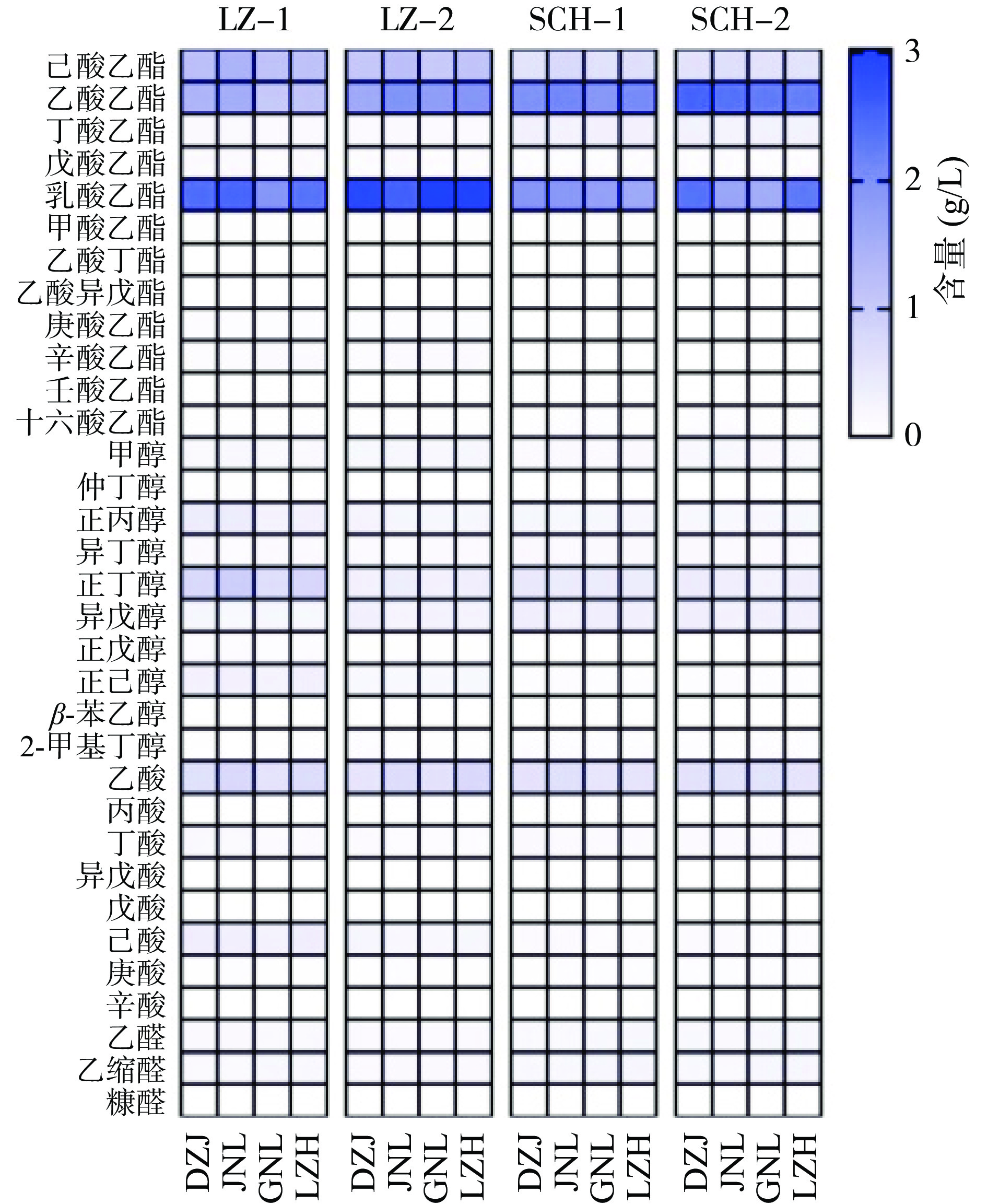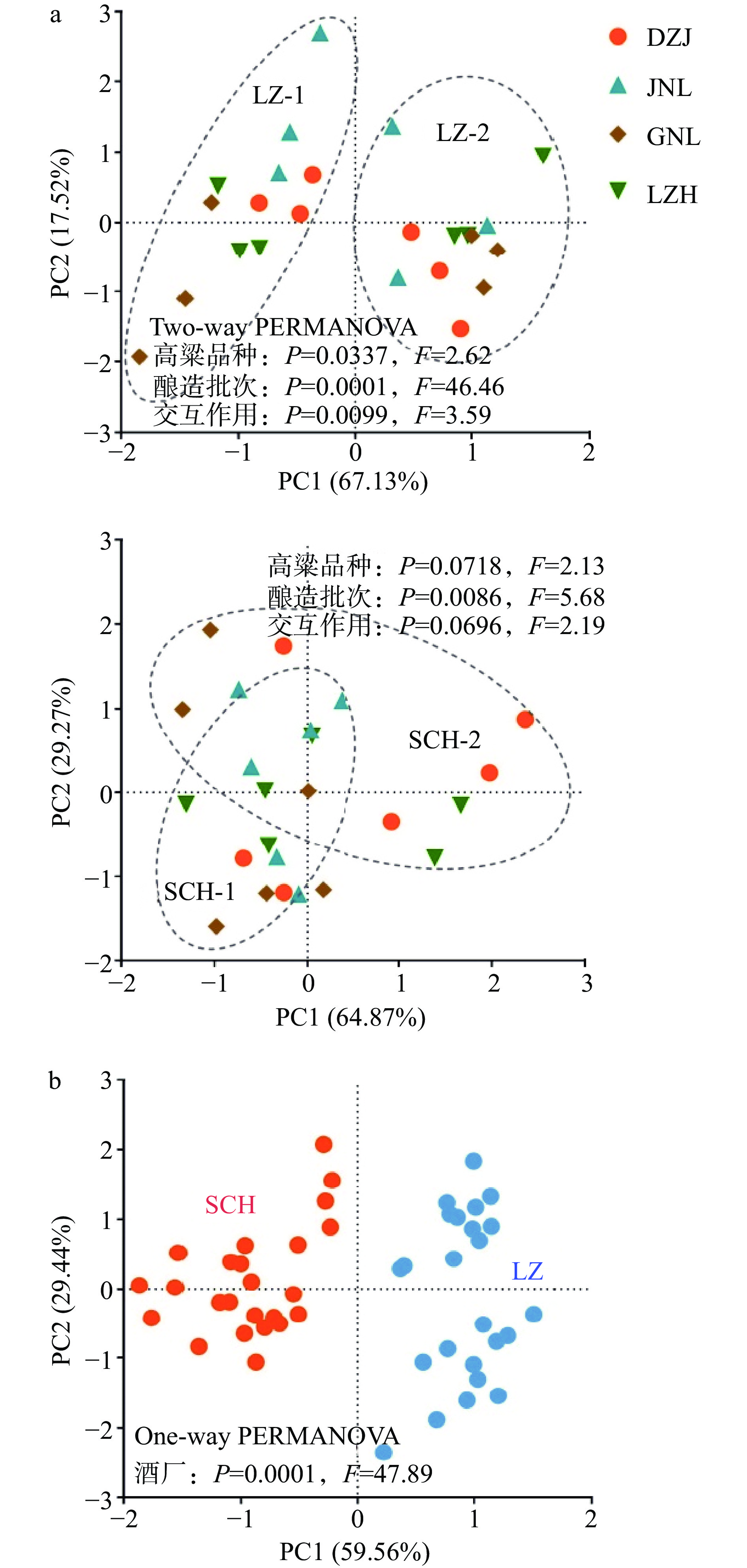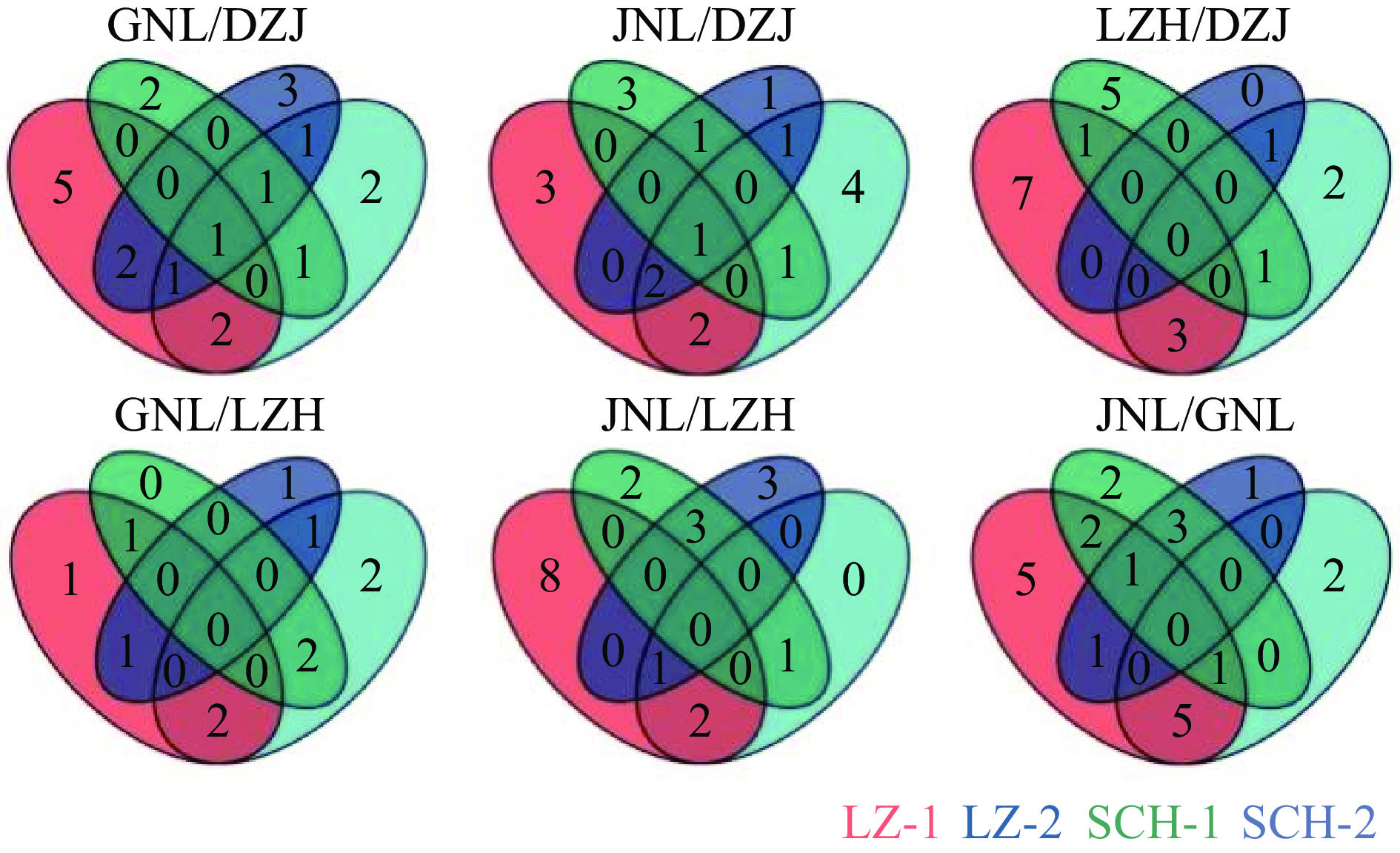Differences in the Composition of Flavor Compounds of Nongxiangxing Baijiu Brewed from Different Varieties of Sorghum and Its Influencing Factors
-
摘要: 在两个酒厂对四种酿酒高粱开展浓香型白酒的多批次大生产酿造试验,采用高效气相色谱技术检测酒样香味物质含量,探究不同高粱酒样的香味物质组成差异及其影响因素。结果显示,酒样香味物质的结构组成受到酒厂、酿造批次和高粱品种等因素的影响,其中酿造批次的影响大于高粱品种。不同高粱酒样的差异香味物质种类及其数量随酒厂和酿造批次的不同而不同,从中筛查到6种较可靠的差异香味物质(2-甲基丁醇、仲丁醇、异丁醇、异戊醇、甲醇、丙酸),其中北方杂交粳高粱酒样的杂醇油含量明显高于糯高粱(金糯梁1号和机糯梁2号)。酒样香味物质的结构组成、酯类与醛类的总量以及丙酸和甲醇的含量均受入窖酒醅酸度的显著影响(P<0.05)。高粱的单宁含量显著影响醛类和异丁醇的含量(P<0.05),支链淀粉含量显著影响仲丁醇的含量(P<0.05)。获得了基于酒醅和高粱的理化成分为自变量预测差异香味物质含量的多元回归方程,对预测变量的解释度(R2)分别为23.00%~51.00%和14.60%~18.80%。本研究结果可为酿酒高粱的品种改良与推广以及酿酒工艺参数的优化完善奠定基础。Abstract: In two Baijiu-making distilleries, multiple batches of Nongxiangxing Baijiu were produced from four varieties of brewing sorghum. Using high performance gas chromatography, the flavor compounds in Baijiu samples were detected, and differences in their composition and influencing factors were investigated. It was found that distillery, brewing batch, and sorghum variety all affected the composition of flavor compounds, where brewing batch had a greater influence than sorghum variety. With respect to Baijiu samples of different varieties of sorghum, the types and quantities of differential flavor compounds varied greatly with distilleries and brewing batches, and six reliable differential flavor compounds were obtained, including 2-methyl-1-butanol, sec-butyl alcohol, isobutanol, isoamyl alcohol, methanol, and propionic acid. The fusel oil content in Baijiu sample produced by northern hybrid japonica sorghum was significantly higher than that in glutinous sorghums (Jinuoliang No.1 and Jinuoliang No.2). The acidity of Jiupei at the beginning of brewing significantly affected the composition of flavor compounds, the amount of esters and aldehydes, and the content of propionic acid and methanol in Baijiu sample (P<0.05). The tannin content of sorghum significantly affected the contents of aldehydes and isobutanol, and the amylopectin content affected the contents of sec-butyl alcohol (P<0.05). On the basis of the physicochemical properties of the Jiupei and sorghum, multiple regression equations were obtained to predict the differential flavor compounds, with an explanatory degree ranging from 23.00% to 51.00% and 14.60% to 18.80%, respectively. The study laid the foundation for improving and popularizing brewing sorghum varieties as well as optimizing and perfecting the brewing process parameters.
-
Keywords:
- Chinese liquor /
- brewing raw materials /
- flavor compounds /
- glutinous sorghum /
- hybrid sorghum
-
白酒是以粮谷为原料,经发酵、蒸馏、陈酿而成的酒精饮料,是中华民族传统文化的瑰宝[1]。因酿造工艺和主体香味的不同,白酒分为12种香型,浓香型白酒产量占比70%以上[1-2]。白酒的香味物质复杂多样,其组成影响酒质的优劣[3]。研究显示,不同酿酒原料的理化品质存在差异,酿造白酒的香味物质组成具有显著区别[4-7]。因此,解析不同原料的酿造酒质差异及其成因可为原料的合理选用和新品种的选育推广提供依据。
高粱是酿造白酒的重要原料,因制种方式的不同分为常规和杂交种,按支链和直链淀粉含量比例的差异分为糯、粳高粱[8]。以往研究关注了不同类型高粱的酿造酒质差异,但主要基于实验室发酵试验进行[9-14],大生产条件下的评估也主要针对一个酒厂的单批次酿造酒样开展[15-19]。然而白酒酿造是在半开放环境下进行,其发酵过程的微生物群落常受生产操作[20]、酿造批次[21]、环境气候[22]、窖池窖龄及其质量等[2]因素的影响。因此,不同原料酿造白酒的香味物质组成差异也可能因酒厂和酿造批次的不同而具有差异,为酿酒效果的准确评价带来较大难度。基于此,本研究以不同类型高粱的代表性品种为材料,在两个酒厂同时开展浓香型白酒的多批次大生产酿造试验,解析酒样的香味物质组成差异及其影响因素,以期为相关研究的深入奠定基础。
1. 材料与方法
1.1 材料与仪器
DZJ、JNL(机糯梁2号)、GNL(金糯粱1号)、LZH(泸州红1号) 以上高粱均为四川酒类企业的主要酿酒品种,由泸州市酒类行业协会根据品种的代表性选取,其中JNL、GNL和LZH由本研究所选育制种[23-25],DZJ由试验酒厂提供,高粱基本信息见表1;盐酸、氢氧化钠、硫酸铜等常规理化试剂 生工生物工程(上海)股份有限公司;内标及香味物质标准品 色谱纯,美国Sigma-Aldrich公司。
表 1 供试高粱的理化成分Table 1. Physicochemical properties of the studied sorghum varieties品种 种植区域及类型 理化成分(%) 粗蛋白 粗脂肪 粗淀粉 单宁 支链淀粉 DZJ 北方杂交粳高粱 9.01 3.31 75.52 1.35 79.50 JNL 北方杂交糯高粱 8.83 3.55 73.98 0.81 96.30 GNL 四川杂交糯高粱 9.24 3.22 74.08 1.56 99.00 LZH 四川常规糯高粱 9.58 3.76 72.77 2.08 94.10 Clarus 500气相色谱仪(配有FID火焰离子化检测器) 美国PerkinElmer公司;CP-Wax 57 CB柱(50 m×0.25 mm×0.2 μm酸性) 美国Agilent公司;XPR205D5/AC电子分析天平 瑞士Mettler Toledo公司;PB10 pH仪 德国Sartorius公司;HH-M8恒温水浴锅 江苏新春兰科学仪器有限公司;H03-B磁力搅拌器 上海梅颖浦仪器仪表制造有限公司;滴定管(50 mL)和电炉(1000 W) 德阳博力化工有限公司。
1.2 实验方法
1.2.1 酿造试验
浓香型白酒是白酒市场的主导酒品[1-2],其生产以“窖池发酵”为特征[26]。本研究浓香型白酒酿造试验于2019年9月~2020年4月在四川省泸州市的泸藏酒厂、顺城和酒厂同时进行。每种高粱在各酒厂均采用3个窖池酿造,窖龄为30年。每个窖池投入的高粱、糠壳和大曲的重量分别为1620、140和405 kg。酿造试验进行两批,每批酿造周期为80 d。各酒厂的酿造生产由同一批工人操作。
1.2.2 样品采集
入窖酒醅在酿造起始期(0 d)采集。以窖池表面中心位置为采样点,利用课题组专利[27]采集窖池上、中、下层酒醅等量混合作为供试样品。酿造结束后,每个窖池取出的酒醅分为9甑蒸馏。蒸馏结束后先将每甑酒样混合,再从中取100 mL混合酒样供试,共48份酒样。
1.2.3 酒样香味物质色谱分析
用无菌蒸馏水将酒样的酒精稀释为60.5%后,采用气相色谱检测香味物质的含量,用2-甲基-2-丁醇(含量1.20 g/L)、乙酸戊酯(2.50 g/L)和2-乙基丁酸(1.20 g/L)作内标进行定量,计算方式为:
y=a×cb 式中:y表示被检出物质的含量,g/L;a和b分别表示被检出物质和内标物质的峰面积;c为内标物质的含量,g/L。
色谱反应条件为:以氮气为载气;流速1 mL/min;柱初始温度250 ℃;进样量1 μL;柱温程序为35 ℃保持8 min,3 ℃/min升高至85 ℃,5 ℃/min升高至155 ℃,10 ℃/min升高至210 ℃,210 ℃保持15 min[28]。
1.2.4 酒样感官评价
由5名国家级白酒评委根据《白酒质量要求:浓香型白酒》(GB/T 10781.1-2021)和《白酒感官评品导则》(GB/T 33404-2016)对酒样进行感官尝评,描述酒样的总体风味特征。
1.2.5 理化成分分析
高粱的理化成分含量由农业部谷物及制品质量监督检测测试中心(哈尔滨)检测。酒醅淀粉含量参照GB 5009.9-2016中的酸水解法测定。还原糖含量参照GB 5009.7-2016中的直接滴定法测定。水分含量参照GB 5009.3-2016中的直接干燥法测定。酸度参照GB 5009.239-2016中的pH计法测定。
1.3 数据处理
采用主成分分析(Principal Component Analysis,PCA)表征酒样香味物质的结构组成,采用置换多元方差分析(PERMANOVA)揭示香味物质组成的差异,以上分析通过PAST 3软件[29]完成。采用偏最小二乘法判别分析(Partial Least Squares Discriminant Analysis,PLSDA)筛查不同品种高粱酒样的差异香味物质,PLSDA和韦恩(Venn)分析通过R软件完成。酒样香味物质和酒醅理化成分含量的方差分析以及理化成分和香味物质的多元线性回归分析(进入法) 均由SPSS 20.0完成。图片制作通过GraphPad Prism (8.0)完成。
2. 结果与分析
2.1 酒样香味物质的结构组成
白酒的香味物质以酯、醇、酸、醛为主[3]。本研究检测了酒样的33种主要香味物质,包括12种酯、10种醇、8种酸和3种醛。结果显示,不同酒厂和酿造批次的酒样均以乳酸乙酯、乙酸乙酯和己酸乙酯的含量较高,乙酸丁酯、戊酸和β-苯乙醇含量较低,说明其结构组成具有相似性(图1)。另一方面,不同品种高粱酒样的香味物质总量具有明显差异,并且其表现形式因酒厂和批次的不同而不同,如泸藏酒厂JNL品种的第1批酒样中酯含量显著高于GNL(P<0.05),但在顺城和酒厂中无显著差异(P>0.05)(图2)。PCA和PERMANOVA分析进一步显示,酒样香味物质的结构组成具有显著的酿造批次和酒厂差异(图3)。其中,泸藏酒厂酒样香味物质的结构组成受高粱品种、酿造批次以及两者交互作用的影响,顺城和酒厂的酒样受酿造批次的影响(图3a);两个酒厂酒样香味物质组成具有的酿造批次差异均大于高粱品种差异。
2.2 酒样差异香味物质筛查
以PLSDA变量权重值(Variable Importance in Projections, VIP)>1和含量倍数变化(Fold Change, FC)>1.20或<0.83筛查不同品种高粱酒样的差异香味物质。如图4所示,差异香味物质的种类和数量随酒厂和酿造批次的不同而具有差异。在两个酒厂四批酒样的筛查结果中,仅有JNL、DZJ品种对应酒样之间的2-甲基丁醇和GNL、DZJ品种对应酒样之间的仲丁醇为共有差异香味物质并且FC的变化趋势一致(表2),说明它们是较可靠的差异香味物质。为进一步揭示潜在的差异香味物质,以VIP>1和FC变化趋势一致为标准进行筛查,共获得6个差异香味物质。其中,JNL品种对应酒样中的异丁醇、异戊醇、2-甲基丁醇和GNL品种对应酒样中的仲丁醇含量低于DZJ;JNL品种对应酒样中的丙酸含量高于DZJ,其甲醇含量高于LZH和GNL。
表 2 不同品种高粱酒样的差异香味物质Table 2. Differential flavor compounds in Baijiu samples produced by different sorghum varieties筛查标准 对比品种 差异香味物质 LZ-1 LZ-2 SCH-1 SCH-2 VIP FC VIP FC VIP FC VIP FC A JNL/DZJ 2-甲基丁醇 1.43 0.67 1.49 0.72 1.33 0.80 1.57 0.77 GNL/DZJ 仲丁醇 1.40 0.57 1.25 0.71 1.67 0.80 1.23 0.82 B JNL/DZJ 异丁醇 1.27 0.86 1.48 0.74 1.25 0.85 1.58 0.74 异戊醇 1.40 0.71 1.52 0.72 1.30 0.85 1.53 0.84 2-甲基丁醇 1.43 0.67 1.49 0.72 1.33 0.80 1.57 0.77 丙酸 1.67 1.25 1.50 1.53 1.37 1.14 1.55 1.42 GNL/DZJ 仲丁醇 1.40 0.57 1.25 0.71 1.67 0.80 1.23 0.82 JNL/LZH 甲醇 1.16 1.25 1.44 1.05 1.10 1.07 1.45 1.11 JNL/GNL 甲醇 1.20 1.21 1.51 1.13 1.37 1.11 1.53 1.18 2-甲基丁醇 1.12 0.75 1.64 0.83 1.34 0.79 1.43 0.84 注: A:VIP>1且FC>1.20或<0.83且FC的变化趋势一致;B:VIP>1且FC的变化趋势一致。 2.3 入窖酒醅理化成分
由表3可知,同一高粱入窖酒醅的理化成分含量具有酒厂和酿造批次差异,如DZJ在泸藏酒厂第2批的入窖酸度显著低于其余批次(P<0.05)。此外,入窖酒醅理化成分含量具有的高粱品种差异因酒厂和批次的不同而不同,如还原糖含量在泸藏、顺城和酒厂的第2批酿造中具有高粱品种差异,其中JNL显著高于GNL(P<0.05),GNL显著高于DZJ和LZH(P<0.05),但在第1批酿造时无差异(P>0.05)。
表 3 入窖酒醅的理化成分Table 3. Physicochemical properties of Jiupei at the beginning of brewing理化成分 酿造批次 高粱品种 DZJ JNL GNL LZH 酸度(mol/kg) LZ-1 0.16±0.01A 0.16±0.02B 0.17±0.02AB 0.17±0.01B LZ-2 0.13±0.014abB 0.16±0.01aB 0.13±0.03abB 0.11±0.002bC SCH-1 0.17±0.01bA 0.19±0.01abA 0.20±0.01aA 0.19±0.01bA SCH-2 0.16±0.01A 0.17±0.01AB 0.17±0.02AB 0.15±0.01B) 淀粉(g/kg) LZ-1 188.73±2.54bAB 183.5±3.80bcB 180.5±4.19cC 201.5±5.50aB LZ-2 189.97±6.05cAB 202.7±7.95bA 205.17±4.04bA 220.7±2.36aA SCH-1 180.9±5.98B 187.23±4.55B 191.23±5.22B 186.6±11.38C SCH-2 196.07±5.37abA 203.7±5.34aA 201.47±3.33aA 191.4±2.13bBC 水分(%) LZ-1 58.60±1.19aAB 57.18±1.75abA 56.26±0.22abA 55.17±1.44bA LZ-2 58±1.37aBC 54.96±0.76bBC 54.4±0.40bC 52.75±0.01cB SCH-1 60.21±0.74aA 56.67±0.97bAB 55.77±0.87bAB 55.93±0.71bA SCH-2 56.35±0.15aC 54.33±0.73bC 54.76±0.69bBC 55.89±0.42aA 还原糖(g/kg) LZ-1 6.00±3.74 3.87±0.25B 3.10±0.20 4.50±2.70AB LZ-2 7.13±3.78ab 10.57±4.08aA 2.73±2.57b 7.47±1.65abA SCH-1 3.67±0.32 3.17±0.31B 6.50±4.42 3.43±0.15B SCH-2 4.03±0.15b 4.37±0.64abB 5.17±0.47a 3.87±0.50bB 注:不同小写、大写字母分别表示同行和同列数值差异显著(P<0.05)。 2.4 理化成分对香味物质结构组成的影响
根据酒样香味物质的PCA,主成分1(PC1)的方差贡献率为59.56%,说明已提取到结构矩阵的大部分信息(图3b)。以PC1数值为因变量,入窖酒醅和高粱的理化成分为自变量进行多元线性回归分析(表4)。结果显示,入窖酒醅的酸度对PC1数值具有显著影响,回归方程R2为0.346,表明对预测变量PC1的解释度为34.60%。
表 4 理化成分对香味物质结构组成 (PC1) 的多元线性回归分析Table 4. Multilinear regression analysis of physicochemical properties versus composition (PC1) of flavor compounds项目 自变量 非标准化系数 t值 P值 回归方程 R2 回归系数和截距 标准误差 入窖酒醅理化 常量 6.465 10.033 0.644 0.523 Y=6.465−2.549X1−
0.218X2+0.028X3+0.661X40.346 酸度(X1) −2.549 0.594 −4.288 0.000 淀粉(X2) −0.218 0.218 −1.001 0.323 水分(X3) 0.028 0.108 0.258 0.797 还原糖(X4) 0.661 0.503 1.314 0.196 高粱理化 常量 0.346 2.804 0.123 0.902 − 0.016 粗脂肪(X2) 0.281 0.751 0.373 0.711 单宁(X4) 0.062 0.342 0.182 0.856 支链淀粉(X5) −0.015 0.020 −0.764 0.449 注:高粱的粗蛋白和粗淀粉在回归分析中是排除变量;表5~表6同。 2.5 理化成分对香味物质含量的影响
分别以酒样酯、醇、酸、醛的总量和 6个差异香味物质的含量为因变量(图2和表2),入窖酒醅和高粱的理化成分为自变量进行多元线性回归分析。结果显示,酒样酯类、醛类的总量以及丙酸、甲醇的含量均受入窖酒醅酸度的显著影响(P<0.05),相关回归方程对预测变量的解释度(R2)23.00%~51.00%(表5)。高粱方面,单宁含量显著影响醛类和异丁醇的含量(P<0.05),仲丁醇含量受支链淀粉影响(P<0.05),回归方程的解释度为14.60%~18.80%(表6)。
表 5 入窖酒醅理化成分对酒样香味物质的多元线性回归分析Table 5. Multilinear regression analysis of physicochemical properties of Jiupei at the beginning of brewing versus content of flavor compounds项目 类别 自变量 非标准化系数 t值 P值 回归方程 R2 回归系数和截距 标准误差 香味物质 酯类 常量 0.332 6.146 0.054 0.957 Y=0.332−1.446X1+0.152X2
+0.076X3+0.293X40.460 X1 −1.446 0.364 −3.971 0.000 X2 0.152 0.133 1.138 0.261 X3 0.076 0.066 1.152 0.256 X4 0.293 0.308 0.952 0.346 醛类 常量 0.737 0.571 1.290 0.204 Y=0.737+0.135X1−0.008X2
−0.009X3−0.040X40.427 X1 0.135 0.034 3.975 0.000 X2 −0.008 0.012 −0.645 0.522 X3 −0.009 0.006 −1.430 0.160 X4 −0.040 0.029 −1.404 0.168 差异香味物质 丙酸 常量 −42.609 59.387 −0.717 0.477 Y=−42.609+11.179X1+1.922X2
+0.004X3−4.463X40.230 X1 11.179 3.518 3.177 0.003 X2 1.922 1.289 1.492 0.143 X3 0.004 0.637 0.006 0.995 X4 −4.463 2.979 −1.498 0.141 甲醇 常量 536.442 243.980 2.199 0.033 Y=536.442−73.658X1−4.437X2
−3.551X3+23.180X40.510 X1 −73.658 14.455 −5.096 0.000 X2 −4.437 5.295 −0.838 0.407 X3 −3.551 2.617 −1.357 0.182 X4 23.180 12.237 1.894 0.065 注:X1:酸度;X2:淀粉;X3:水分;X4:还原糖;仅显示与自变量显著相关的因变量;表6同。 表 6 高粱理化成分对酒样香味物质的多元线性回归分析Table 6. Multilinear regression analysis of physicochemical properties of sorghum versus content of flavor compounds项目 类别 自变量 非标准化系数 t值 P值 回归方程 R2 回归系数和截距 标准误差 香味物质 醛类 常量 0.162 0.155 1.046 0.301 Y=0.162−0.037X2+
0.051X4+0.002X50.188 X2 −0.037 0.041 −0.894 0.376 X4 0.051 0.019 2.672 0.011 X5 0.002 0.001 1.773 0.083 差异香味物质 异丁醇 常量 186.920 48.402 3.862 0.000 Y=186.920−15.348X2+
12.609X4−0.625X50.167 X2 −15.348 12.964 −1.184 0.243 X4 12.609 5.908 2.134 0.038 X5 −0.625 0.345 −1.815 0.076 仲丁醇 常量 24.527 13.167 1.863 0.069 Y=24.527+3.980X2−
2.225X4−0.223X50.146 X2 3.980 3.527 1.129 0.265 X4 −2.225 1.607 −1.384 0.173 X5 −0.223 0.094 −2.374 0.022 注:X2:粗淀粉;X4:单宁;X5:支链淀粉。 2.6 酒样感官尝评
不同品种高粱酒样的感官风味具有明显差异。总体上,LZH、JNL和GNL酒样的风味相似,DZJ的酒体较单薄、余味短杂(表7)。
表 7 酒样感官评价Table 7. Sensory evaluation of Baijiu samples高粱品种 风味特点 LZH 无色透明、窖香浓郁、粮香舒适、酒体绵甜醇厚、余味悠长 JNL 无色透明、窖香较浓郁、粮香明显、酒体绵甜醇和、余味悠长 GNL 无色透明、窖香较正、粮香较明显、糟香露头、
酒体醇和、余味较长DZJ 无色透明、窖香较正、糟香露头、酒体单薄、余味短杂 3. 讨论
本研究结果表明,酒样香味物质的结构组成受到酒厂、酿造批次和高粱品种等因素的影响,其中酿造批次的影响大于高粱品种(图1~图3),这可能是由不同批次间入窖酒醅理化成分含量的差异所造成(表3~表5)。本研究在每个酒厂的酿造生产均由同一批工人操作,但仍无法保证每批生产的操作完全一致。目前,白酒的生产过程尚缺乏有效的质量控制标准,对工人的操作技能和生产经验有较强的依赖性[30]。在原料的粉碎、浸泡、蒸煮等操作环节的细微差异均可能造成入窖酒醅理化性质的改变[20,31],从而影响酒质。这突显了开展多酒厂、多批次酿造试验评价原料酿酒效果的必要性,也提示通过生产工艺的优化改良来减小不同原料的酒质差异具有可行性。
本研究发现,入窖酒醅的酸度对酒样香味物质的含量及其结构组成具有显著影响(表4~表5),这可能与酒醅酸度的不同会造成酿酒微生物群落结构出现差异有关[32]。除生产工艺外,高粱自身的理化品质对酒醅酸度也具有重要影响。如有研究认为,原料的蛋白质含量过高会促进杂菌生长,导致酒醅酸度上升[33]。此外,有研究通过模拟发酵试验发现,高粱的脂肪和单宁与白酒香味物质的含量具有显著相关性[4,14]。本研究在大生产条件下进一步揭示了单宁和支链淀粉对香味物质具有的显著影响(表6)。然而,高粱理化成分对酒质的影响主要是通过酒醅的理化成分来实现。高粱和酒醅理化性质之间具有何种关系,又是如何通过影响微生物的发酵活动来影响酒质等问题需进一步研究。
本研究筛查出的差异香味物质以醇类为主(表2)。其中,甲醇是白酒酿造过程中需严格控制的关键指标,其含量过高会产生神经毒性,危害人体健康[34]。尽管JNL的甲醇含量明显高于LZH和GNL,但所有酒样的甲醇含量(0.10~0.18 g/L)均低于《食品安全国家标准 蒸馏酒及其配制酒》(GB 2757-2012)的限量标准(≤0.60 g/L,酒精度100%),符合安全规范。其余的醇类物质属于杂醇油,包括2-甲基丁醇、仲丁醇、异丁醇和异戊醇[35]。杂醇油是指含2个以上碳原子的高级醇,是造成白酒口感苦涩短杂、酒体浑浊的重要原因[35]。因此,DZJ酒样的杂醇油含量高于JNL和GNL可能是其杂味较重的原因之一(表7)。然而本研究也发现,LZH酒样与DZJ的杂醇油含量无差异,但其酒样未表现出明显杂味,表明影响口感的因素较复杂。如除绝对含量外,风味物质的结构组成对人体的感知强度也存在重要影响[36]。
已往研究表明,浓香型白酒的香味物质以酯类为主,其中四大酯(己酸乙酯、丁酸乙酯、乙酸乙酯、乳酸乙酯)的含量对酒质的影响最大[1],其质量还因己酸乙酯含量的差异被分为不同等级(GB/T 10781.1-2021)。与以往研究结果一致,本研究不同品种高粱酒样的香味物质均以乳酸乙酯、乙酸乙酯和己酸乙酯为主,但它们并非差异香味物质。相反,揭示的差异香味物质均是酒样中的低含量物质。因此本研究推测,四大酯的含量可能决定了浓香型白酒的主体风味,但影响酒质差异的很可能是一些低含量物质。因此,白酒酒质评价的理化指标有待进一步优化完善。
4. 结论
本研究解析了四种高粱酿造浓香型白酒的香味物质组成差异。结果表明,酒样香味物质的结构组成受到酒厂、酿造批次和高粱品种等因素的影响,其中酿造批次的影响大于高粱品种,本文筛查到6种较可靠的差异香味物质,为2-甲基丁醇、仲丁醇、异丁醇、异戊醇、甲醇和丙酸;入窖酒醅的酸度、高粱的单宁和支链淀粉含量对香味物质的结构组成具有明显影响,其中,窖酒醅酸度对酒样香味物质的结构组成、酯类与醛类的总量以及丙酸和甲醇的含量有显著影响(P<0.05),高粱的单宁含量显著影响醛类和异丁醇的含量(P<0.05),支链淀粉含量显著影响仲丁醇的含量(P<0.05)。研究结果说明,要准确评价原料的酿酒效果需以多酒厂、多批次的酿造试验为基础,也提示通过生产工艺的优化改良来减小不同原料的酒质差异具有可行性。
-
表 1 供试高粱的理化成分
Table 1 Physicochemical properties of the studied sorghum varieties
品种 种植区域及类型 理化成分(%) 粗蛋白 粗脂肪 粗淀粉 单宁 支链淀粉 DZJ 北方杂交粳高粱 9.01 3.31 75.52 1.35 79.50 JNL 北方杂交糯高粱 8.83 3.55 73.98 0.81 96.30 GNL 四川杂交糯高粱 9.24 3.22 74.08 1.56 99.00 LZH 四川常规糯高粱 9.58 3.76 72.77 2.08 94.10 表 2 不同品种高粱酒样的差异香味物质
Table 2 Differential flavor compounds in Baijiu samples produced by different sorghum varieties
筛查标准 对比品种 差异香味物质 LZ-1 LZ-2 SCH-1 SCH-2 VIP FC VIP FC VIP FC VIP FC A JNL/DZJ 2-甲基丁醇 1.43 0.67 1.49 0.72 1.33 0.80 1.57 0.77 GNL/DZJ 仲丁醇 1.40 0.57 1.25 0.71 1.67 0.80 1.23 0.82 B JNL/DZJ 异丁醇 1.27 0.86 1.48 0.74 1.25 0.85 1.58 0.74 异戊醇 1.40 0.71 1.52 0.72 1.30 0.85 1.53 0.84 2-甲基丁醇 1.43 0.67 1.49 0.72 1.33 0.80 1.57 0.77 丙酸 1.67 1.25 1.50 1.53 1.37 1.14 1.55 1.42 GNL/DZJ 仲丁醇 1.40 0.57 1.25 0.71 1.67 0.80 1.23 0.82 JNL/LZH 甲醇 1.16 1.25 1.44 1.05 1.10 1.07 1.45 1.11 JNL/GNL 甲醇 1.20 1.21 1.51 1.13 1.37 1.11 1.53 1.18 2-甲基丁醇 1.12 0.75 1.64 0.83 1.34 0.79 1.43 0.84 注: A:VIP>1且FC>1.20或<0.83且FC的变化趋势一致;B:VIP>1且FC的变化趋势一致。 表 3 入窖酒醅的理化成分
Table 3 Physicochemical properties of Jiupei at the beginning of brewing
理化成分 酿造批次 高粱品种 DZJ JNL GNL LZH 酸度(mol/kg) LZ-1 0.16±0.01A 0.16±0.02B 0.17±0.02AB 0.17±0.01B LZ-2 0.13±0.014abB 0.16±0.01aB 0.13±0.03abB 0.11±0.002bC SCH-1 0.17±0.01bA 0.19±0.01abA 0.20±0.01aA 0.19±0.01bA SCH-2 0.16±0.01A 0.17±0.01AB 0.17±0.02AB 0.15±0.01B) 淀粉(g/kg) LZ-1 188.73±2.54bAB 183.5±3.80bcB 180.5±4.19cC 201.5±5.50aB LZ-2 189.97±6.05cAB 202.7±7.95bA 205.17±4.04bA 220.7±2.36aA SCH-1 180.9±5.98B 187.23±4.55B 191.23±5.22B 186.6±11.38C SCH-2 196.07±5.37abA 203.7±5.34aA 201.47±3.33aA 191.4±2.13bBC 水分(%) LZ-1 58.60±1.19aAB 57.18±1.75abA 56.26±0.22abA 55.17±1.44bA LZ-2 58±1.37aBC 54.96±0.76bBC 54.4±0.40bC 52.75±0.01cB SCH-1 60.21±0.74aA 56.67±0.97bAB 55.77±0.87bAB 55.93±0.71bA SCH-2 56.35±0.15aC 54.33±0.73bC 54.76±0.69bBC 55.89±0.42aA 还原糖(g/kg) LZ-1 6.00±3.74 3.87±0.25B 3.10±0.20 4.50±2.70AB LZ-2 7.13±3.78ab 10.57±4.08aA 2.73±2.57b 7.47±1.65abA SCH-1 3.67±0.32 3.17±0.31B 6.50±4.42 3.43±0.15B SCH-2 4.03±0.15b 4.37±0.64abB 5.17±0.47a 3.87±0.50bB 注:不同小写、大写字母分别表示同行和同列数值差异显著(P<0.05)。 表 4 理化成分对香味物质结构组成 (PC1) 的多元线性回归分析
Table 4 Multilinear regression analysis of physicochemical properties versus composition (PC1) of flavor compounds
项目 自变量 非标准化系数 t值 P值 回归方程 R2 回归系数和截距 标准误差 入窖酒醅理化 常量 6.465 10.033 0.644 0.523 Y=6.465−2.549X1−
0.218X2+0.028X3+0.661X40.346 酸度(X1) −2.549 0.594 −4.288 0.000 淀粉(X2) −0.218 0.218 −1.001 0.323 水分(X3) 0.028 0.108 0.258 0.797 还原糖(X4) 0.661 0.503 1.314 0.196 高粱理化 常量 0.346 2.804 0.123 0.902 − 0.016 粗脂肪(X2) 0.281 0.751 0.373 0.711 单宁(X4) 0.062 0.342 0.182 0.856 支链淀粉(X5) −0.015 0.020 −0.764 0.449 注:高粱的粗蛋白和粗淀粉在回归分析中是排除变量;表5~表6同。 表 5 入窖酒醅理化成分对酒样香味物质的多元线性回归分析
Table 5 Multilinear regression analysis of physicochemical properties of Jiupei at the beginning of brewing versus content of flavor compounds
项目 类别 自变量 非标准化系数 t值 P值 回归方程 R2 回归系数和截距 标准误差 香味物质 酯类 常量 0.332 6.146 0.054 0.957 Y=0.332−1.446X1+0.152X2
+0.076X3+0.293X40.460 X1 −1.446 0.364 −3.971 0.000 X2 0.152 0.133 1.138 0.261 X3 0.076 0.066 1.152 0.256 X4 0.293 0.308 0.952 0.346 醛类 常量 0.737 0.571 1.290 0.204 Y=0.737+0.135X1−0.008X2
−0.009X3−0.040X40.427 X1 0.135 0.034 3.975 0.000 X2 −0.008 0.012 −0.645 0.522 X3 −0.009 0.006 −1.430 0.160 X4 −0.040 0.029 −1.404 0.168 差异香味物质 丙酸 常量 −42.609 59.387 −0.717 0.477 Y=−42.609+11.179X1+1.922X2
+0.004X3−4.463X40.230 X1 11.179 3.518 3.177 0.003 X2 1.922 1.289 1.492 0.143 X3 0.004 0.637 0.006 0.995 X4 −4.463 2.979 −1.498 0.141 甲醇 常量 536.442 243.980 2.199 0.033 Y=536.442−73.658X1−4.437X2
−3.551X3+23.180X40.510 X1 −73.658 14.455 −5.096 0.000 X2 −4.437 5.295 −0.838 0.407 X3 −3.551 2.617 −1.357 0.182 X4 23.180 12.237 1.894 0.065 注:X1:酸度;X2:淀粉;X3:水分;X4:还原糖;仅显示与自变量显著相关的因变量;表6同。 表 6 高粱理化成分对酒样香味物质的多元线性回归分析
Table 6 Multilinear regression analysis of physicochemical properties of sorghum versus content of flavor compounds
项目 类别 自变量 非标准化系数 t值 P值 回归方程 R2 回归系数和截距 标准误差 香味物质 醛类 常量 0.162 0.155 1.046 0.301 Y=0.162−0.037X2+
0.051X4+0.002X50.188 X2 −0.037 0.041 −0.894 0.376 X4 0.051 0.019 2.672 0.011 X5 0.002 0.001 1.773 0.083 差异香味物质 异丁醇 常量 186.920 48.402 3.862 0.000 Y=186.920−15.348X2+
12.609X4−0.625X50.167 X2 −15.348 12.964 −1.184 0.243 X4 12.609 5.908 2.134 0.038 X5 −0.625 0.345 −1.815 0.076 仲丁醇 常量 24.527 13.167 1.863 0.069 Y=24.527+3.980X2−
2.225X4−0.223X50.146 X2 3.980 3.527 1.129 0.265 X4 −2.225 1.607 −1.384 0.173 X5 −0.223 0.094 −2.374 0.022 注:X2:粗淀粉;X4:单宁;X5:支链淀粉。 表 7 酒样感官评价
Table 7 Sensory evaluation of Baijiu samples
高粱品种 风味特点 LZH 无色透明、窖香浓郁、粮香舒适、酒体绵甜醇厚、余味悠长 JNL 无色透明、窖香较浓郁、粮香明显、酒体绵甜醇和、余味悠长 GNL 无色透明、窖香较正、粮香较明显、糟香露头、
酒体醇和、余味较长DZJ 无色透明、窖香较正、糟香露头、酒体单薄、余味短杂 -
[1] ZHENG X F, HAN B Z. Baijiu (白酒), Chinese liquor: History, classification and manufacture[J]. Journal of Ethnic Foods,2016,3(1):19−25. [2] 刘茂柯, 唐玉明, 赵珂, 等. 浓香型白酒窖泥微生物群落结构及其选育应用研究进展[J]. 微生物学通报,2017,44(5):1222−1229. [LIU Maoke, TANG Yuming, ZHAO Ke, et al. Recent advances in research on the community, isolation, and application of microbes in the pit mud used in manufacture of Chinese Strong-flavor Baijiu[J]. Microbiology China,2017,44(5):1222−1229. [3] LIU H, SUN B. Effect of fermentation processing on the flavor of Baijiu[J]. Journal of Agricultural and Food Chemistry,2018,66(22):5425−5432. doi: 10.1021/acs.jafc.8b00692
[4] HAN X L, WANG D L, ZHANG W J, et al. The production of the Chinese Baijiu from sorghum and other cereals[J]. Journal of the Institute of Brewing,2017,123(4):600−604. doi: 10.1002/jib.450
[5] 江伟, 韦杰, 李宝生, 等. 不同原料酿造单粮白酒风味物质特异性分析[J]. 食品科学,2020,41(14):234−238. [JIANG Wei, WEI Jie, LI Baosheng, et al. Analysis of characteristic flavor compounds in single-grain Chinese Baijiu brewed from different raw materials[J]. Food Science,2020,41(14):234−238. doi: 10.7506/spkx1002-6630-20190701-006 [6] 程度, 曹建兰, 王珂佳, 等. 高粱对酱香型白酒品质影响的研究进展[J]. 食品科学,2022,43(7):356−364. [CHENG Du, CAO Jianlan, WANG Kejia, et al. Progress in understanding the effect of sorghum on the quality of Maotai-flavor baijiu[J]. Food Science,2022,43(7):356−364. doi: 10.7506/spkx1002-6630-20210116-182 [7] 王志伟, 闫凤霞, 徐嘉良, 等. 3 种高粱品种淀粉特性和酿造黄酒的风味品质分析[J]. 食品科学,2019,40(13):45−51. [WANG Zhiwei, YAN Fengxia, XU Jialiang, et al. Analysis of starch properties and Huangjiu flavor from three sorghum varieties[J]. Food Science,2019,40(13):45−51. doi: 10.7506/spkx1002-6630-20180528-388 [8] CHEN B R, WANG C Y, WANG P, et al. Genome-wide association study for starch content and constitution in sorghum (Sorghum bicolor (L.) Moench)[J]. Journal of Integrative Agriculture,2019,18(11):2446−2456. doi: 10.1016/S2095-3119(19)62631-6
[9] 李媛媛, 邓杰, 郑若欣, 等. 两种高粱的酿造特性对比研究[J]. 食品研究与开发,2020,41(15):40−45. [LI Yuanyuan, DENG Jie, ZHENG Ruoxin, et al. Comparative study on brewing characteristics of two kinds of sorghum[J]. Food Research and Development,2020,41(15):40−45. doi: 10.12161/j.issn.1005-6521.2020.15.008 [10] 冯兴垚, 杨文斌, 罗惠波, 等. 三种酿酒高粱的理化特性与基酒风味分析[J]. 中国酿造,2017,36(8):76−79. [FENG Xingyao, YANG Wenbin, LUO Huibo, et al. Physicochemical property of three varieties of sorghum for Baijiu-making and flavor of base liquor[J]. China Brewing,2017,36(8):76−79. doi: 10.11882/j.issn.0254-5071.2017.08.017 [11] 郭敏, 保玉心, 黄永光, 等. 不同高粱品种酿造酱香型白酒发酵特性的研究[J]. 中国酿造,2018,37(1):102−107. [GUO Min, BAO Yuxin, HUANG Yongguang, et al. Fermentation characteristics of Moutai-flavor Baijiu with different sorghum varieties[J]. China Brewing,2018,37(1):102−107. doi: 10.11882/j.issn.0254-5071.2018.01.022 [12] 杨文斌, 艾涛波, 罗玥, 等. 三种不同产地高粱模拟浓香型白酒发酵过程中发酵特性的研究[J]. 食品工业科技,2019,40(14):170−173,181. [YANG Wenbin, AI Taobo, LUO Yue, et al. Fermentation characteristics of three kinds of sorghum simulated Luzhou-flavor liquor during fermentation[J]. Science and Technology of Food Industry,2019,40(14):170−173,181. [13] 田殿梅, 吴冬梅, 张玫, 等. 浓香型大曲酒优质酿造高粱品种的筛选[J]. 食品与发酵科技,2020,56(6):64−68. [TIAN Dianmei, WU Dongmei, ZHANG Mei, et al. Selection of high quality sorghum in Luzhou-flavor liquor[J]. Food and Fermentation Sciences and Technology,2020,56(6):64−68. [14] WU Q, CAO S, XU Y. Effects of glutinous and nonglutinous sorghums on Saccharomyces cerevisiae fermentation for Chinese liquor making[J]. International Journal of Food Science and Technology,2017,52(6):1348−1357. doi: 10.1111/ijfs.13330
[15] 田殿梅, 霍丹群, 张良, 等. 3 种不同品种高粱发酵酒糟及基酒品质的差异[J]. 食品与发酵工业,2013,39(7):74−78. [TIAN Dianmei, HUO Danqun, ZHANG Liang, et al. Quality differences of grains and base liquor from three different species of sorghum's fermentation[J]. Food and Fermentation Industries,2013,39(7):74−78. [16] 姚贤泽, 杨生智, 万贤平, 等. 不同品种糯高粱酿造小曲清香型白酒差异研究[J]. 酿酒科技,2020(8):61−64,69. [YAO Xianze, YANG Shengzhi, WAN Xianping, et al. Differences in qingxiang xiaoqu Baijiu produced by different varieties of glutinous sorghum[J]. Liquor-Making Science and Technology,2020(8):61−64,69. [17] 王贵军, 赵正鑫, 浦文立, 等. 北方粳高粱与四川糯高粱在酱香型白酒生产中的比较研究[J]. 酿酒科技,2017(9):61−64. [WANG Guijun, ZHAO Zhengxin, PU Wenli, et al. Comparison between Sichuan red sorghum and Japonica sorghum as raw materials in Jiangxiang baijiu production[J]. Liquor-Making Science and Technology,2017(9):61−64. [18] 郭旭凯, 杨玲, 张福耀, 等. 高粱子粒理化特性与清香型大曲白酒酿造关系的研究[J]. 中国酿造,2016,35(12):40−43. [GUO Xukai, YANG Ling, ZHANG Fuyao, et al. Relationship between physicochemical properties of sorghum and Fen-flavor Daqu Baijiu fermentation[J]. China Brewing,2016,35(12):40−43. doi: 10.11882/j.issn.0254-5071.2016.12.008 [19] 孙细珍, 熊亚青, 杜佳炜, 等. 不同品种高粱小曲白酒感官表征及重要风味物质对比分析[J]. 食品与发酵工业,2022,48(9):34−40. [SUN Xizhen, XIONG Yaqing, DU Jiawei, et al. Comparative analysis of aroma compounds in Xiaoqu Baijiu fermented by different varieties of sorghum[J]. Food and Fermentation Industries,2022,48(9):34−40. [20] ZHANG H, WANG L, WANG H, et al. Effects of initial temperature on microbial community succession rate and volatile flavors during Baijiu fermentation process[J]. Food Research International,2021,141:109887. doi: 10.1016/j.foodres.2020.109887
[21] 王琳, 胡小霞, 黄永光. 茅台镇酱香型白酒不同生产轮次酿造环境的细菌菌群结构特征[J]. 食品科学,2021,42(22):185−192. [WANG Lin, HU Xiaoxia, HUANG Yongguang. Characteristics of bacterial microflora structure in environmental samples from different rounds of Maotai-flavor liquor fermentation in Maotai town[J]. Food Science,2021,42(22):185−192. doi: 10.7506/spkx1002-6630-20200708-113 [22] WANG S, XIONG W, WANG Y, et al. Temperature-induced annual variation in microbial community changes and resulting metabolome shifts in a controlled fermentation system[J]. mSystems,2020,5(4):e00555−20.
[23] 闫松显, 吕云怀, 王莉, 等. 西南区酿酒高粱的种质形成和发展[J]. 中国酿造,2017,36(5):17−21. [YAN Songxian, LU Yunhuai, WANG Li, et al. Germplasm formation and development of Baijiu-making sorghum in the southwest of China[J]. China Brewing,2017,36(5):17−21. [24] 李顺国, 刘猛, 刘斐, 等. 中国高粱产业和种业发展现状与未来展望[J]. 中国农业科学,2021,54(3):471−482. [LI Shunguo, LIU Meng, LIU Fei, et al. Current status and future prospective of sorghum production and seed industry in China[J]. Scientia Agricultura Sinica,2021,54(3):471−482. doi: 10.3864/j.issn.0578-1752.2021.03.002 [25] 刘天朋, 丁国祥, 倪先林, 等. 施氮量和施氮时期对酿酒糯高粱产量和品质的影响[J]. 中国农学通报,2017,33(9):22−26. [LIU Tianpeng, DING Guoxiang, NI Xianlin, et al. Effect of nitrogen application rate and period on yield and quality of winemaking glutinous sorghum[J]. Chinese Agricultural Science Bulletin,2017,33(9):22−26. doi: 10.11924/j.issn.1000-6850.casb16080026 [26] LIU M K, TANG Y M, GUO X J, et al. Structural and functional changes in prokaryotic communities in artificial pit mud during Chinese baijiu production[J]. mSystems,2020,5(2):e00829−19.
[27] 四川省农业科学院水稻高粱研究所. 用于酒窖内酒糟的取样器: 中国, 201922353883.5[P]. 2020-09-22[2022-08-23]. https://kns.cnki.net/kcms/detail/detail.aspx?dbcode=SCPD&dbname=SCPD202002&filename=CN211553443U&uniplatform=NZKPT&v=jeSgv5rqlFuC6Lbg_TY8akQO-Y-h1aq_8PqQASF4Z-pMc5ECTed_PqXLzEOQKVMx. Institute of Rice and Sorghum, Sichuan Academy of Agricultural Sciences. Sampler for distiller's grains in wine cellar: 201922353883.5[P]. 2020-09-22[2022-08-23]. https://kns.cnki.net/kcms/detail/detail.aspx?dbcode=SCPD&db- name=SCPD202002&filename=CN211553443U&uniplatform=NZ KPT&v=jeSgv5rqlFuC6Lbg_TY8akQO-Y-h1aq_8PqQASF4Z- pMc5ECTed_PqXLzEOQKVMx
[28] LIU M K, TANG Y M, GUO X J, et al. Deep sequencing reveals high bacterial diversity and phylogenetic novelty in pit mud from Luzhou Laojiao cellars for Chinese strong-flavor Baijiu[J]. Food Research International,2017,102:68−76. doi: 10.1016/j.foodres.2017.09.075
[29] HAMMER Ø, HARPER D A, RYAN P D. PAST: Paleontological statistics software package for education and data analysis[J]. Palaeontologia Electronica,2001,4(1):1−9.
[30] JIN G Y, ZHU Y, XU Y. Mystery behind Chinese liquor fermentation[J]. Trends in Food Science and Technology,2017,63:18−28. doi: 10.1016/j.jpgs.2017.02.016
[31] 张彩飞, 张阳阳, 尉晓东, 等. 前处理工艺对白酒原料淀粉利用率的影响[J]. 食品与发酵工业,2018,44(6):115−118. [ZHANG Caifei, ZHANG Yangyang, YU Xiaodong, et al. The effect of pre-processing on starch utilization initial research[J]. Food and Fermentation Industries,2018,44(6):115−118. [32] 赵亮, 闵卓, 吴福勇, 等. 酱香型酒醅堆积发酵过程中优势菌群和稀有菌群对细菌总群落演替模式的影响[J]. 食品科学,2022,43(2):168−175. [ZHAO Liang, MIN Zhuo, WU Fuyong, et al. Roles of rare and abundant taxa in bacterial succession during pile fermentation in Moutai-flavored Baijiu making[J]. Food Science,2022,43(2):168−175. doi: 10.7506/spkx1002-6630-20210107-071 [33] 田殿梅, 张玫, 吴冬梅, 等. 浓香型白酒酿造品质影响因素研究概述[J]. 酿酒科技,2020(7):75−78,82. [TIAN Dianmei, ZHANG Mei, WU Dongmei, et al. Research progress in influencing factors of nongxiang Baijiu quality[J]. Liquor-Making Science and Technology,2020(7):75−78,82. [34] 陈发河, 吴光斌. 毛细管气相色谱法测定白酒中的甲醇、乙酸乙酯和杂醇油[J]. 食品科学,2007,28(1):232−234. [CHEN Fahe, WU Guangbin. Determination of methanol, ethyl acetate and fusel oils in Chinese spirits by capillary gas chromatography[J]. Food Science,2007,28(1):232−234. [35] 李长军, 杨生智, 曹亚龙, 等. 小曲酒新工艺澳洲高粱发酵酒醅秋季杂醇油升高原因的研究[J]. 酿酒科技,2019(1):81−85. [LI Changjun, YANG Shengzhi, CAO Yalong, et al. Reasons for fusel oil increase in fermented grains using australian sorghum in autumn[J]. Liquor-Making Science and Technology,2019(1):81−85. [36] 方亚鹏, 高志明. 食品组分相互作用对食品胶体结构及营养与风味输送特性的影响[J]. 中国食品学报,2016,16(7):7−16. [FANG Yapeng, GAO Zhiming. Impacts of food component interactions on the formation of food colloidal structures and their characteristics associated with nutrient/flavor delivery[J]. Journal of Chinese Institute of Food Science and Technology,2016,16(7):7−16. -
期刊类型引用(11)
1. 刘影,庞富,陈佳鸿,陈炯葵,蔡烁仪. 本草清咽润喉糖的配方优化及抗氧化研究. 农产品加工. 2024(21): 41-46 .  百度学术
百度学术
2. 张敏君,段雪伟,王燕,杨慧文,刘冰,向文静,由天辉. 构树根皮活性成分乙醇提取工艺优化及其抗氧化活性分析. 食品工业科技. 2023(11): 196-203 .  本站查看
本站查看
3. 王蕙雯. 豫西自然发酵柿子醋抗氧化性研究. 江苏调味副食品. 2023(03): 20-23 .  百度学术
百度学术
4. 裴文清,吕泸楠,王靖宇,浦思琦,雷霜,王春丽. 木瓜皮多酚和黄酮提取工艺优化及酪氨酸酶与胰脂肪酶抑制活性研究. 食品工业科技. 2022(01): 188-195 .  本站查看
本站查看
5. 周新崇,易灿,刘进兵. 微波辅助提取崀山脐橙皮总黄酮及生物活性研究. 邵阳学院学报(自然科学版). 2022(02): 87-95 .  百度学术
百度学术
6. 张清月,董姝慧,李胤豪,赵艳丽,史彬林,闫素梅. 诺丽果不同提取物抗氧化能力的比较研究. 中国粮油学报. 2022(05): 144-150 .  百度学术
百度学术
7. 关随霞,王蕙雯,杨肖瑞,郭淑敏,张翅,张培杰,李道敏. 大青叶总黄酮提取工艺优化及抗氧化性研究. 中国食品添加剂. 2022(09): 138-144 .  百度学术
百度学术
8. 陈慧玲,刘芳,钟恒勤,王伟枫. 超声波辅助乙醇提取百香果皮黄酮的工艺优化及黄酮抗氧化性测定. 宁德师范学院学报(自然科学版). 2022(03): 280-287 .  百度学术
百度学术
9. 任海云,韩瑞,张磊. 基于Box-Behnken响应面法优化党参抗氧化活性组分提取工艺. 中医药信息. 2022(12): 5-10 .  百度学术
百度学术
10. 赵雨晴,王宝庆,徐汉,刘楠楠. 醉鱼草总黄酮的提取及抗氧化活性研究. 化学试剂. 2021(07): 979-985 .  百度学术
百度学术
11. 杨青青,龚吉军. 响应面法优化超声辅助葛根浸提工艺及浸提液抗氧化活性研究. 食品安全质量检测学报. 2021(13): 5409-5417 .  百度学术
百度学术
其他类型引用(3)





 下载:
下载:






 下载:
下载:



